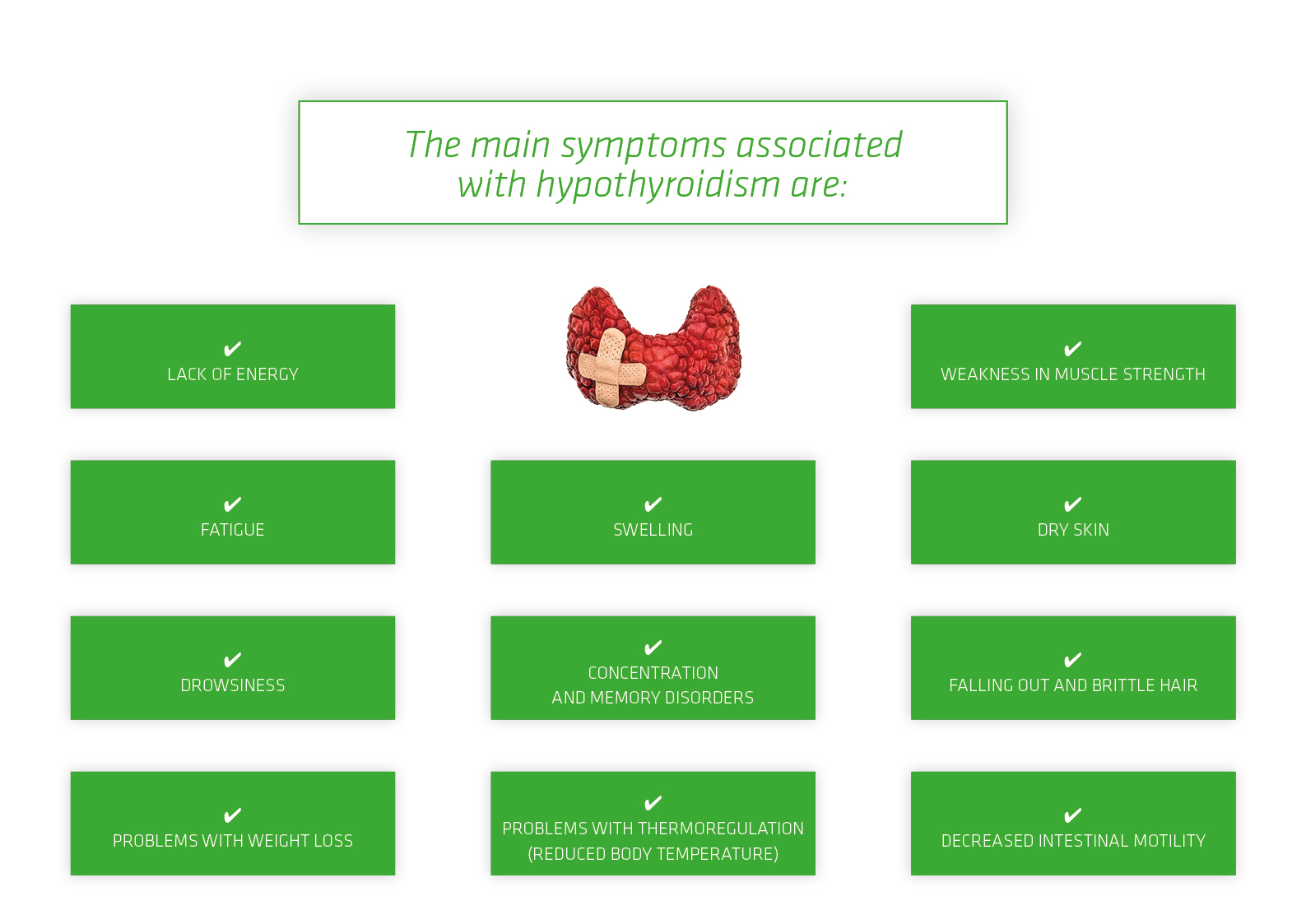Thyroid plays a very important role in the body and is often called the "queen of metabolism" for a reason. Almost every cell in our body is equipped with receptors for thyroid hormones, so it is very sensitive to any changes in the body. Currently, it is believed that hypothyroidism is a civilization disease affecting 1-6% of the population. People practicing sports should take care of prophylaxis and prevent the development of this disease entity. Abnormal functioning of the thyroid gland often caused by poorly selected training, as well as a deficient diet can have a significant negative impact on sports performance.
What is hypothyroidism?
Thyroid is a small gland located on the neck. Hypothyroidism is manifested by an insufficient amount of produced thyroxine (T4) and triiodothyronine (T3). The mentioned hormones regulate the metabolism, additionally they are necessary for normal tissue growth, development of the central nervous system, bone growth, and the proper course of puberty.

Of course, these symptoms are characteristic of many disease entities, so on their basis we cannot make a definite diagnosis. However, if you notice symptoms suggesting the possibility of thyroid disease, be sure to visit a doctor! It is necessary to conduct laboratory tests, and then the specialist, depending on the results obtained, will select a therapy that will restore the physiological values of thyroid hormones.
What are the causes of hypothyroidism?
There may be many reasons for hypothyroidism. Unfortunately, frequently occurring irregularities are the result of restrictive diets and too intense physical exercise. Providing too few calories in the long run results in a decrease in T4 hormone conversion in T3. Long-term reduction of the energy consumed contributes to the conversion of T4 into the inverse T3 (rT3), through which our body stores energy in stressful situations. This situation is associated with metabolic disorders, which certainly does not facilitate the achievement of dream body. One of the causes of hypothyroidism may be overtraining. Lack of proper regeneration is associated with huge stress, which will negatively affect the work of the thyroid gland.
Physical activity and hypothyroidism

The type and length of effort, age and sex of the athlete will determine the decrease in the number of thyroid hormones. Certainly regular, properly selected physical activity will improve the functioning of the thyroid gland. However, it should be noted that they should be moderate intensity exercises (at the level of about 70% of maximum heart rate). According to studies, long and intense runs (competition above 21 km), as well as medium intensity efforts repeated for several days may lead to a non-pathological and transient decrease in the number of hormones produced by the thyroid gland. The situation, depending on the preparation of the athlete, may last from 24 to 72 hours, after which the hormone levels return to the initial state. Moderate efforts (60-65% VO2 max) compared to the interval sessions at 100% VO2 max lead to much shorter changes in the level of thyroid hormones.
Based on the above evidence, in the case of intensive maximum and submaximal efforts, simply longer regeneration is required. In the case of too long-lasting overloading of the organism, the persistent chronically reduced amounts of hormones can result in serious health consequences. Of course, the availability of energy should also be considered, because the maintenance of a correct, reasonable caloric balance will support the functioning of the thyroid gland.
Conclusions? Pathological changes in hormone levels will result primarily from caloric deficiencies, created by over-intensive workouts and a low-calorie diet.
If you have not done regular physical activity so far and you have been diagnosed with hypothyroidism, start calmly and gradually increase the intensity of your workouts.
The training applied must be adapted to:
• occurring symptoms,
• advancement of the disease,
• fitness level.
How to deal with when you suffer from hypothyroidism?
Taking only hormone pills is not enough, and sometimes it is not even necessary. Without changing their lifestyle and finding a reason, ready-made solutions in the form of drugs will only mask the problem. The key to effectively fight the disease is to eliminate processed foods from the diet and to introduce an anti-inflammatory diet, care for regeneration and the appropriate dose of physical activity. Optimizing your diet and lifestyle are basic steps to heal your thyroid gland. In many cases, adequate supplementation is also needed, based on research results, which will slowly fill up the shortages. After the elimination of harmful foods, the implementation of appropriate training, and the inclusion of appropriate supplementation support is often noticeable improvement manifested by a better frame of mind, quality of hair, skin, and the return of energy to life.

The basic principle that allows for proper operation of the thyroid gland
• Do not drastically reduce calories in the diet and do not use too restrictive reductions.
• Remember that the more often and intensively you train the more the energy demand increases.
• Take care of the quality of food - provide the right amount of nutrients, vitamins and minerals.
• Give up too intense training - because it will put a heavy strain on the nervous system, lowering the regeneration potential and ultimately affect the thyroid function negatively. Another hard workout instead of bringing you closer to your dream figure, can lead to excessive body wasting, increased cortisol levels and, paradoxically, weight gain.
• Train wisely - maybe it's worth reducing the frequency of training - put on quality, not on quantity.
• Remember to do the exercises correctly.
• Take care of the right amount and quality of sleep.
• Take care of regeneration - first do not ignore non-painful symptoms! If the fatigue after training lasts for a few days or gets worse, it is time to reduce the intensity of training.
• Take care of appropriate supplementation, adapted to the test results.
Conclusions
The key to the proper functioning of the thyroid is to find a golden mean. Currently, very common cause of thyroid disorders is overtraining and simultaneous use of a low-calorie diet. However, properly selected training, rich-nutritional, unprocessed diet and listening to your own body will allow you to achieve desired results, while maintaining full health. Awareness of the impact of physical exercise on the work of the thyroid allows for quick response at the time of emerging disturbing changes. It is important to observe your own body and flexibly adjust the training and diet plan to your current state of health.





